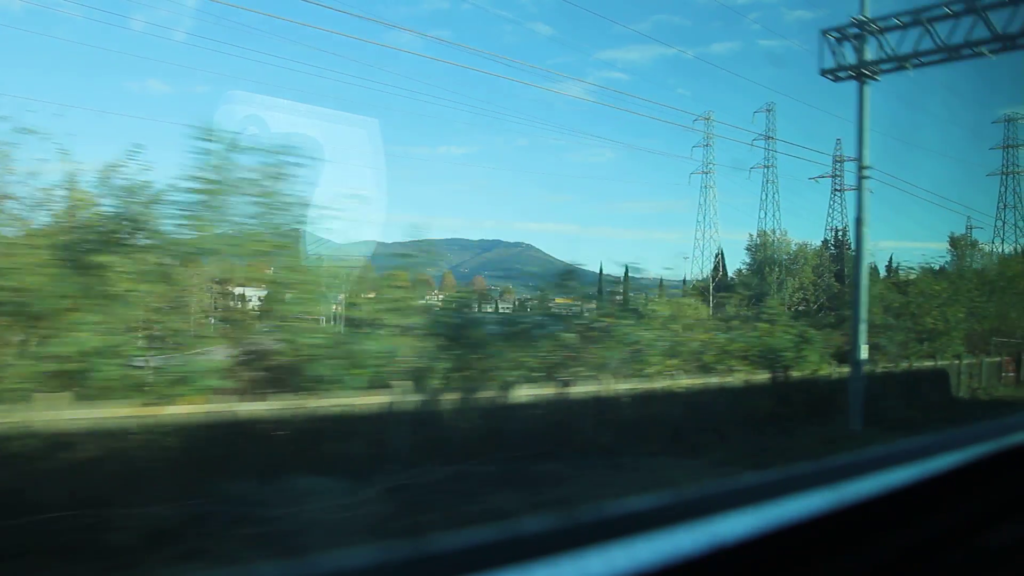This is the final installment of Amit Chaudhuri’s column, The Moment.
Last year, I commuted between Oxford and Norwich, where I teach in the autumn. On Mondays, I took a train via London; on Tuesday evening, I took the same route back. It’s a four-hour-journey: you travel south and then go up again.
On the trains I read work by students, skimmed through the Guardian, charged my phone (the London-Norwich train is old but is allocated with power sockets), wrote emails, applied finishing touches to pieces I’d written, talked to my wife and a couple of friends, and, when I wasn’t doing any of this, which was a large percentage of the time, ranged over my collection of music on my iPhone.
I never listen to music on earphones when I’m at home in Calcutta – or in Oxford, where I play songs on a small Bose Bluetooth dock that I carry with me. But, like many others, when I’m traveling I create a makeshift interiority. The temptation to create a portable archive presented itself with the introduction of the smartphone. I deferred carrying Walkmans and MP3 players for much of my life. The iPhone has changed our existence – as we think we know, though we can’t, really, because none of us can experience what it means to live in history. It has changed our children, those who were born at the end of the last millennium or at the start of this one: indeed, the smartphone has invented them. For a long time, we thought the personal computer was destined to take us over. Phones crept upon us unobtrusively. I can no longer recall when I got a Nokia. At first, odd though it may sound, my wife and I shared it. The idea of the personalised phone was still to grow on us. I came similarly late to the iPhone. I can now hardly recall what the words ‘sharing’ and ‘synhronising’ meant in the twentieth century, or for my parents. I have no idea what my daughter’s life would have been like had not the smartphone remade it completely six years ago. It’s useless to speculate on the nature of reality in that way.
One evening, as I was returning to Oxford via London, I realised, soon after getting on to the train at Norwich, that I’d left behind a crucial jack in the room I’d slept in the previous night. I have an iPhone 7 Plus, which brought with it a new piece of bureaucracy. It had replaced the round hole for the earphone socket with a single flat incision meant both for charger and earphones. This meant that you couldn’t charge your phone and listen to music at the same time. It also meant that, if you didn’t want to use Apple’s ineffectual white earphones, you had to prosthetically attach your personal earphones to the 7 Plus with a jack. The train lumbered forward. I was without a jack.
I was thrown into a sort of awareness and mood that people might experience when their phone battery dies. I’ve often wondered what happens to them. It doesn’t happen to me, because I don’t use the phone with enough frequency. Yet, jackless, I was in a situation that may not be unheard-of, but is largely, as yet, undescribed. I had nothing to do. I had forgotten what it means to do nothing, not as a recreational option when one isn’t at work, but to do nothing when one’s main leisure accessory is inert, and there is no work to finish either: when, indeed, you realise any choice in the matter of either doing something or nothing has been removed. The result is an ennui which was once such a constant in my – in everyone’s – life, and which has become absent in the last decade. I was so numbed by the missing jack that I didn’t even look at the phone to check messages or social media. And I felt again what it meant to wait: to sit somewhere ostensibly without purpose, with nothing to absorb you, while at the same time moving forward with an onward motion – the train’s, and life’s.
I looked out of the window. Again, this routine examination of the world passing by is not something we do any more. If we’re listening to music, the view accompanies what’s interior to us: a soundtrack. Now what I heard was a creaking that confirmed the journey – of the train rocking or slowing – but otherwise had no significance. Without music in the ear, you have to start composing the universe anew from pieces of sensory data: there’s nothing prefabricated about the world, however familiar it is. You become aware of it, not as a yogi, but like a bored teenager who, suddenly conscious of superfluity, wants to be elsewhere. Without the phone, we also become aware of something else: the self, this hapless thing that’s lost without us, and accompanies us without acknowledgement or thought of outcome. It’s tramp-like: discomfiting and inchoate. We can’t ask it to get off the train.
The moment of distraction is unlike those periods in which a poet experiences a creative impulse, for instance. No enlightenment occurs here. Is it some animal-like (I say this without wishing to romanticise it) vacancy? Without the phone on the journey, we’re simply waiting for something to be over. The word ‘patience’ has too many humane connotations to capture this interval of looking and listening. We’ve devised numberless ways to diminish this period. Yet, once we lose it altogether, we’re struck by its resistance to categorisation on its unlooked-for return.
Amit Chaudhuri is a novelist, essayist, poet, and musician. His most recent novel is Friend of My Youth.
from The Paris Review https://ift.tt/2xxjmnL

Comments
Post a Comment